This article was co-authored by Kerry Assil, MD. Dr. Kerry Assil is a board certified Ophthalmologist and the Medical Director and CEO of Assil Eye Institute (AEI), an ophthalmology practice in Los Angeles, California. With over 25 years of experience and as one of the world's foremost experts in eye surgery, Dr. Assil has trained 14,000+ physicians in refractive and cataract surgery, performed 70,000+ eye surgeries, and authored over 100 textbooks, chapters, and articles on refractive and cataract surgery. He's served as the Distinguished Professor lecturer at Harvard, Johns Hopkins, Duke, Baylor, Tokyo, and UCLA among others. He has served on the advisory boards of 20+ ophthalmic device, pharmaceutical, and scientific companies and has appeared in the media as an authority on advances in vision-restoring surgeries and refractive surgery. Dr. Assil continues to make significant advances in his field with numerous inventions and introductions of state-of-the-art technologies.
There are 11 references cited in this article, which can be found at the bottom of the page.
This article has been viewed 380,733 times.
Dirt in your eyes is annoying and painful, and it can even cause bigger problems if it's not taken care of. Fortunately, you should be able to get the dirt and dust out of your eyes on your own. Try the methods below to quickly remove dirt and dust from your eyes and get some relief.
Steps
Getting the Dirt Out
-
1Blink your eyes. You may be able to dislodge the dirt in your eye with very little effort. Once you notice the dirt in your eye, blink your eyes several times. The blinking reflex in the eye allows the lashes and lids to move tears around and remove bacteria and debris out of the eye.
- If simple blinking does not help, stretch your upper eyelid over your lower eyelid and then blink your eye repeatedly. This allows the lashes on the lower lid to sweep the dirt out of your eye.[1]
-
2Wash your hands. If blinking doesn't get the dirt out, you need to intervene. Before touching your eye, however, you need to wash your hands. Washing hands before handling your eyes is important to reduce any possible contamination from bacteria, germs, or additional irritants. You don't want to remove any dirt from your eye only to infect it with something worse. This is important because your eyes are vulnerable to infections.[2]
- Wash your hands with antibacterial soap and warm water. Dry them on a clean towel.[3]
Advertisement -
3Pat away excess tears. When you have dirt in your eye, you will likely have an increase in tear production. If you do, close your eyelids gently and dab your eye with a tissue. The increased tear production will help flush out the dirt.
- Allow your eyes to water and the tears to wash them clean.
- Remember, do not rub your eyes. Use the tissue to gently blot up the overflow as it washes out of your eye.[4]
-
4Inspect your eye. Pull your lower eyelid down and slowly look around, looking for anything lodged in your eyelid. Do the same with your upper eyelid, looking for anything lodged on your eyeball.
- If you want to examine underneath your eyelid, place a cotton swab right above the upper eyelid and flip the lid over with the cotton swab.[5] This will allow you look for any dirt lodged in the eyelid itself.[6]
- If you are having a hard time finding the dirt, have a friend or family member do the inspection for you.
-
5Remove the dirt. If the dirt is on your eyelid or easily accessible area of your eye, you may be able to remove it with a cotton swab. If you can see the area of your eye or eyelid where the dirt is, take a clean cotton swab and dab it on the dirt. It should attach to the end of the swab after you dab it a few times.
- Do not jab your eye with the swab or swipe the swab too harshly against the dirt. This could embed the dirt in your eyelid. If the dirt doesn't come off when you dab it, try another method.
-
6Rinse your eyes. If the dirt hasn't come out with blinking or with a cotton swab, rinse your eyes to get the dirt out. To wash the dirt out of your eye, use an over-the-counter sterile eye wash or pour clean water over your eye using a cup. Keep up a continuous stream over your eye while holding your lids open for 15 minutes. Even after the dirt comes out, keep rinsing to help cleanse any additional debris from your eye.[7]
- If you have an object in your eye, try removing it with artificial tears, if you have any on hand. Tap water could contain organisms that could contaminate your eye if the foreign object caused a scratch.[8] If all you have available is tap water, however, it's okay to use that.
- You can also apply gentle pressure with a stream of water from the faucet to wash debris from your eye, using your fingers to hold your lids open.[9]
- Look for eyewash that has neutral pH of 7.0. Keep the water between 60°F (15.6°C) and 100°F (37.8°C) to keep your eye comfortable.
- If you have an eye bath, which is available at most pharmacies, use this to rinse your eyes.
-
7Do not rub your eye. If there's something in your eye and you rub it, you could scratch the surface of your eye.[10] Instead, try flushing or blotting your eyes to remove whatever's in them.
-
8Seek medical attention. Seek emergency medical treatment right away if your attempts have failed to get the dirt or other debris out of your eye. Seek medical attention right away if you experience any of the following:[11]
- You cannot remove the dirt from your eye
- The dirt is embedded inside your eye
- You experience blurred or otherwise abnormal vision
- Pain, redness, or discomfort continues after the dirt has been removed from the eye
- Blood in the eye, lightheadedness, dizziness, nausea, vomiting, or headache
Taking Care of Your Eye
-
1Expect discomfort. You should expect some minor discomfort after you get the dirt out. It's common to feel a scratchiness or discomfort in your eye, even after you have removed the offending dirt. This is part of the natural healing process and it can take up to 24 hours to recover.[12]
-
2Protect your eye afterward. Take precautionary measures to protect your eye during the recovery process. During this time, your eye is extra sensitive. Protecting your eye includes:
- Protecting eyes from ultraviolet light or bright light by wearing sunglasses
- Avoiding the use of prescription contact lenses until your eye care professional has given the OK
- Avoiding hand contact with the eye area and washing your hands before touching the eye area
- Alerting and informing your eye care professional if new symptom arise or if pain becomes unbearable
- If you continue to feel scratchiness or discomfort in your eye for more than a day after removing the dirt, consult a physician
-
3Seek help. If your eye gets worse, you're going to need to see a specialist. Some after effects can be expected, but the effects should not last more than 24 hours. The continued discomfort and irritation could be a sign of a larger problem or an infection. Symptoms to look for are:
-
4Avoid making the problem worse. There are some actions that you should avoid when dealing with your eyes. These things can cause severe eye injury or pain. These actions include:[15]
- Removing any piece of metal, large or small, that has lodged itself in the eye
- Putting any pressure on the eye itself in an effort to dislodge the dirt
- Using tweezers, toothpicks, or other hard object to get the dirt out
Expert Q&A
Did you know you can get expert answers for this article?
Unlock expert answers by supporting wikiHow
-
QuestionIt feels like I just have a single grain of sand in my eye. Do I do the same thing?
 Chris M. Matsko, MDDr. Chris M. Matsko is a retired physician based in Pittsburgh, Pennsylvania. With over 25 years of medical research experience, Dr. Matsko was awarded the Pittsburgh Cornell University Leadership Award for Excellence. He holds a BS in Nutritional Science from Cornell University and an MD from the Temple University School of Medicine in 2007. Dr. Matsko earned a Research Writing Certification from the American Medical Writers Association (AMWA) in 2016 and a Medical Writing & Editing Certification from the University of Chicago in 2017.
Chris M. Matsko, MDDr. Chris M. Matsko is a retired physician based in Pittsburgh, Pennsylvania. With over 25 years of medical research experience, Dr. Matsko was awarded the Pittsburgh Cornell University Leadership Award for Excellence. He holds a BS in Nutritional Science from Cornell University and an MD from the Temple University School of Medicine in 2007. Dr. Matsko earned a Research Writing Certification from the American Medical Writers Association (AMWA) in 2016 and a Medical Writing & Editing Certification from the University of Chicago in 2017.
Family Medicine Physician
-
QuestionHow do I get dirt out of my eyes?
 Kerry Assil, MDDr. Kerry Assil is a board certified Ophthalmologist and the Medical Director and CEO of Assil Eye Institute (AEI), an ophthalmology practice in Los Angeles, California. With over 25 years of experience and as one of the world's foremost experts in eye surgery, Dr. Assil has trained 14,000+ physicians in refractive and cataract surgery, performed 70,000+ eye surgeries, and authored over 100 textbooks, chapters, and articles on refractive and cataract surgery. He's served as the Distinguished Professor lecturer at Harvard, Johns Hopkins, Duke, Baylor, Tokyo, and UCLA among others. He has served on the advisory boards of 20+ ophthalmic device, pharmaceutical, and scientific companies and has appeared in the media as an authority on advances in vision-restoring surgeries and refractive surgery. Dr. Assil continues to make significant advances in his field with numerous inventions and introductions of state-of-the-art technologies.
Kerry Assil, MDDr. Kerry Assil is a board certified Ophthalmologist and the Medical Director and CEO of Assil Eye Institute (AEI), an ophthalmology practice in Los Angeles, California. With over 25 years of experience and as one of the world's foremost experts in eye surgery, Dr. Assil has trained 14,000+ physicians in refractive and cataract surgery, performed 70,000+ eye surgeries, and authored over 100 textbooks, chapters, and articles on refractive and cataract surgery. He's served as the Distinguished Professor lecturer at Harvard, Johns Hopkins, Duke, Baylor, Tokyo, and UCLA among others. He has served on the advisory boards of 20+ ophthalmic device, pharmaceutical, and scientific companies and has appeared in the media as an authority on advances in vision-restoring surgeries and refractive surgery. Dr. Assil continues to make significant advances in his field with numerous inventions and introductions of state-of-the-art technologies.
Board Certified Ophthalmologist
Warnings
- If you think there could be something in your eye, don't rub it, or you could scratch the surface of your eye.[16]⧼thumbs_response⧽
References
- ↑ https://www.health.harvard.edu/staying-healthy/emergencies-and-first-aid-removing-a-speck-from-the-eye
- ↑ https://www.cdc.gov/handwashing/when-how-handwashing.html
- ↑ http://www.nursingtimes.net/Journals/2014/09/26/c/d/p/011014-How-to-administer-eye-drops-and-ointments.pdf
- ↑ https://www.mayoclinic.org/first-aid/first-aid/basics/art-20056645
- ↑ http://www.nursingtimes.net/Journals/2014/09/26/c/d/p/011014-How-to-administer-eye-drops-and-ointments.pdf
- ↑ http://www.mayoclinic.org/first-aid/first-aid/basics/art-20056645
- ↑ http://www.ccohs.ca/oshanswers/safety_haz/emer_showers.html
- ↑ Kerry Assil, MD. Board Certified Ophthalmologist. Expert Interview. 4 September 2020.
- ↑ http://www.mayoclinic.org/first-aid/first-aid/basics/art-20056645
- ↑ Kerry Assil, MD. Board Certified Ophthalmologist. Expert Interview. 4 September 2020.
- ↑ http://www.mayoclinic.org/first-aid/first-aid/basics/art-20056645
- ↑ http://www.reviewofoptometry.com/content/d/cornea/c/52352/
- ↑ http://www.medscape.com/viewarticle/421501_6
- ↑ https://www.urmc.rochester.edu/encyclopedia/content.aspx?ContentTypeID=1&ContentID=524
- ↑ http://www.mayoclinic.org/first-aid/first-aid/basics/art-20056645
- ↑ Kerry Assil, MD. Board Certified Ophthalmologist. Expert Interview. 4 September 2020.
About This Article
To get dirt out of your eye, stretch your upper eyelid over your lower lid and blink repeatedly to allow the lower lashes to sweep the dirt away. For stubborn dirt, close your eyes gently and tap your lid with a tissue to increase tear production. If all else fails, wash your eye with water or a sterile eye wash solution. Place either liquid in a cup that you can then pour over your eye. You can also place your eye under a gentle, steady stream of water from the faucet. For more tips from our Medical reviewer, including aftercare once you remove the dirt, keep reading!
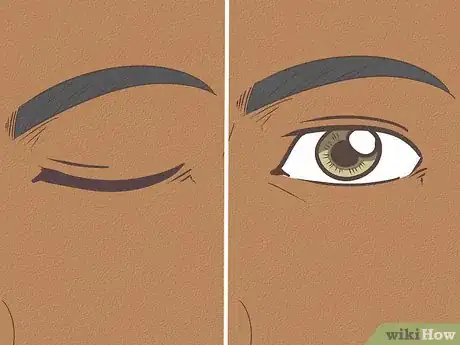
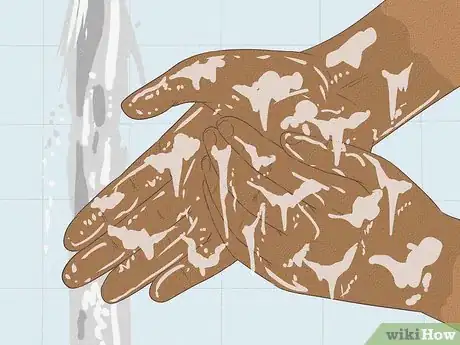
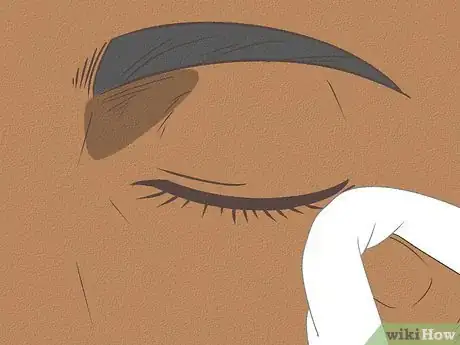
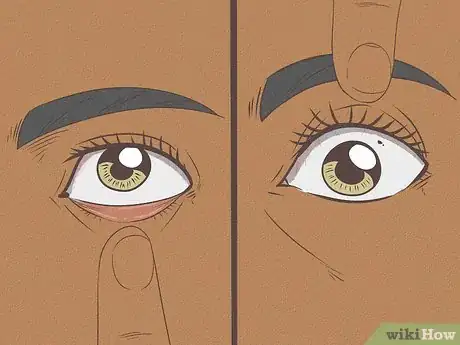
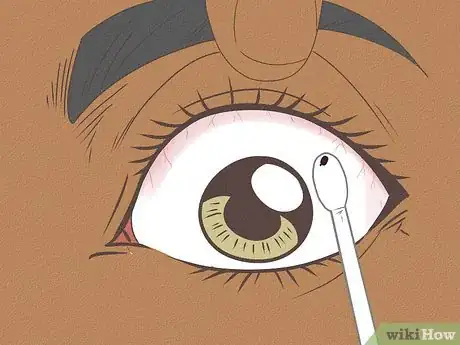
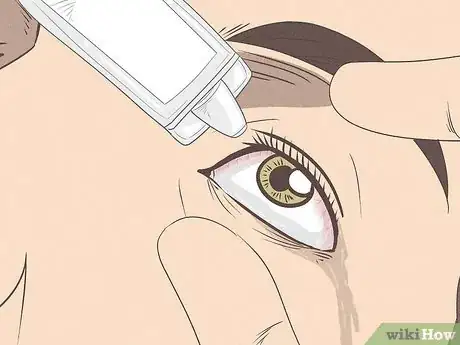

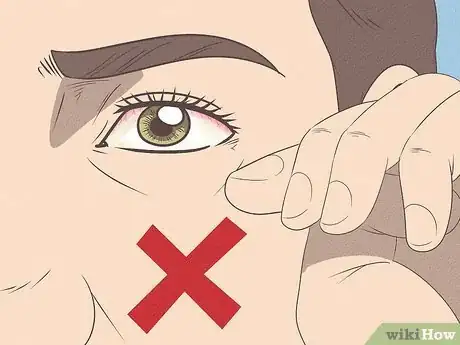
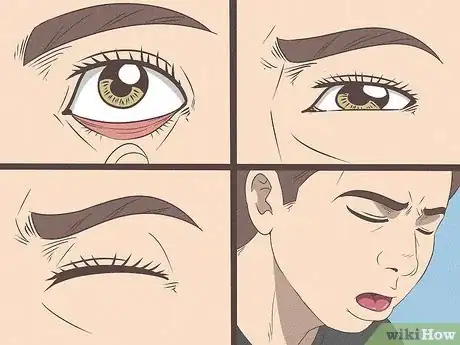
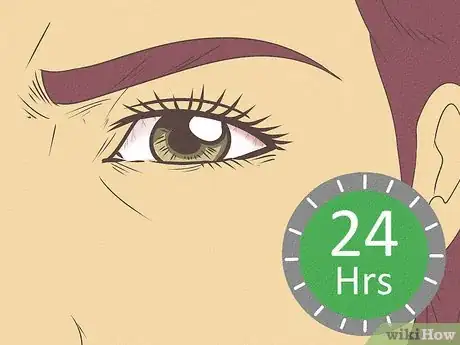

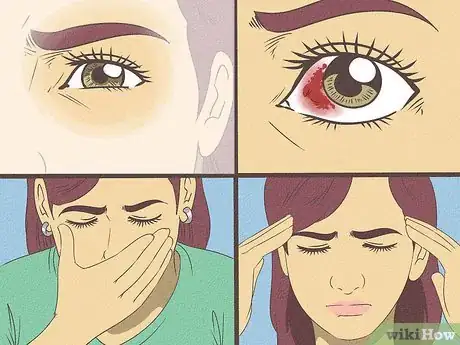
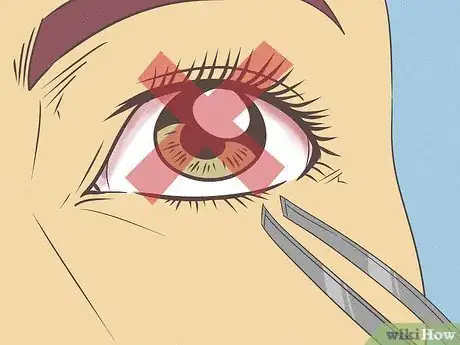
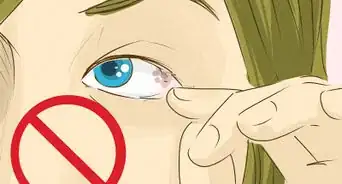
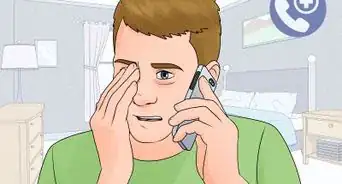



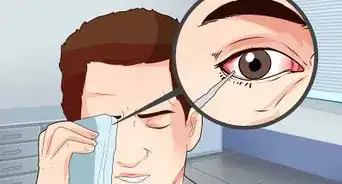
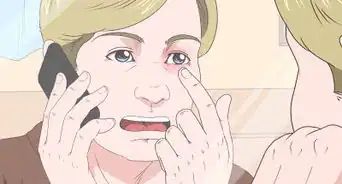



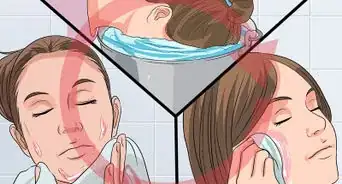
















































Medical Disclaimer
The content of this article is not intended to be a substitute for professional medical advice, examination, diagnosis, or treatment. You should always contact your doctor or other qualified healthcare professional before starting, changing, or stopping any kind of health treatment.
Read More...